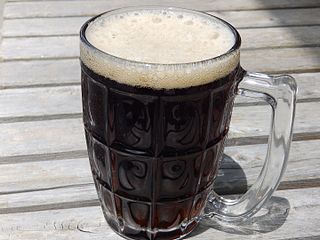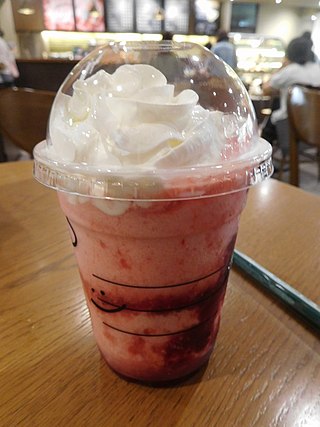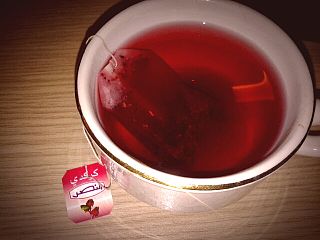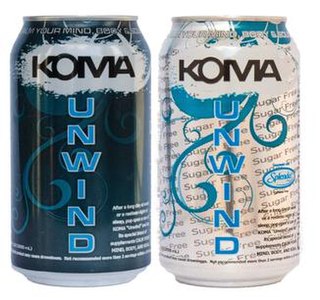
A soft drink is any water-based flavored drink, usually but not necessarily carbonated, and typically including added sweetener. Flavors used can be natural or artificial. The sweetener may be a sugar, high-fructose corn syrup, fruit juice, a sugar substitute, or some combination of these. Soft drinks may also contain caffeine, colorings, preservatives and other ingredients.

Root beer is a sweet North American soft drink traditionally made using the root bark of the sassafras tree Sassafras albidum or the vine of Smilax ornata as the primary flavor. Root beer is typically, but not exclusively, non-alcoholic, caffeine-free, sweet, and carbonated. Like cola, it usually has a thick and foamy head. A common use is to add vanilla ice cream to make a root beer float.

Squash, is a non-alcoholic beverage with concentrated syrup used in beverage making. It is usually fruit-flavoured, made from fruit juice, water, and sugar or a sugar substitute. Modern squashes may also contain food colouring and additional flavouring. Some traditional squashes contain herbal extracts, most notably elderflower and ginger.

Frappuccino is a line of blended iced coffee drinks sold by Starbucks. It may consist of coffee or crème base, blended with ice and ingredients such as flavored syrups and usually topped with whipped cream and or spices. It may also include blended Starbucks refreshers. Frappuccinos are also sold as bottled coffee beverages in grocery stores, convenience stores and from vending machines.

An elixir is a sweet liquid used for medical purposes, to be taken orally and intended to cure one's illness. When used as a pharmaceutical preparation, an elixir contains at least one active ingredient designed to be taken orally.

Surge is a citrus-flavored soft drink first produced in the 1990s by the Coca-Cola Company to compete with Pepsi's Mountain Dew. Surge was advertised as having a more "hardcore" edge, much like Mountain Dew's advertising at the time, in an attempt to lure customers away from Pepsi. It was originally launched in Norway as Urge in 1996, and was so popular that it was released in the United States as Surge in 1997. Lagging sales caused production to be ended in 2003 for most markets.

Horchata, or orxata, is a name given to various beverages, which are generally plant based, but sometimes contain animal milk. In Spain, it is made with soaked, ground, and sweetened tiger nuts. In Latin America and other parts of the Americas, the base is jicaro, melon or sesame seeds, or white rice, along with other spices. Different varieties can be served hot or cold, and may be used as a flavor in other beverages, such as frappé coffee.

Slurpee is the brand name for carbonated slushies sold by 7-Eleven and its subsidiaries A-Plus, Speedway, & Stripes Convenience Stores. The brand originated in 1966 when 7-Eleven made a licensing deal with The Icee Company to sell slushies in 7-Eleven stores.
Energy Brands, also doing business as Glacéau, is a privately owned subsidiary of The Coca-Cola Company based in Whitestone, Queens, New York, that manufactures and distributes various lines of drinks marketed as enhanced water. Founded in May 1996 by J. Darius Bikoff with an electrolyte enhanced line of water called Smartwater, Energy Brands initially distributed its products to health food stores and independent retailers in the New York area. Adding Fruitwater and Vitaminwater to its line in 1998 and 2000, respectively, the company expanded to nationwide distribution in the early 2000s.

Morinda is a multi-level marketing company based in American Fork, Utah that sells Tahitian Noni juice and other products made from the noni plant. The company was founded in 1996 and has manufacturing facilities in Tahiti, Japan, China, Germany, and Utah. Morinda, formerly known as Tahitian Noni International and Morinda Bioactives, was a subsidiary of Morinda Holdings, Inc. prior to merging with and becoming a wholly owned subsidiary of New Age Beverages Corporation in December 2019.

Hibiscus tea is a herbal tea made as an infusion from crimson or deep magenta-colored calyces (sepals) of the roselle flower. It is consumed both hot and cold. It has a tart, cranberry-like flavor.

Four Loko is a line of alcoholic beverages sold by Phusion Projects of Chicago, Illinois, United States. Four Loko's recipe formerly included caffeine. Phusion operates as Drink Four Brewing Company. Four Loko, the company's most popular beverage, debuted in the United States market in 2005 and is available in 49 states, and in 21 countries including Ecuador, Guatemala, Paraguay, The Bahamas, Peru, Mexico, Colombia, Bolivia, Honduras, El Salvador, Nicaragua, Costa Rica, China, Canada and some countries in Europe. The name "Four" is derived from the original drink having four "key ingredients".

Lean, also known as purple drank, purp, sizzurp, syrup, and several other names, is a recreational drug beverage, prepared by mixing prescription-grade cough or cold syrup containing codeine and promethazine with a soft drink. The beverage originated in Houston and is popular in hip hop culture, especially within the Southern United States.
Drink mixers are the non-alcoholic ingredients in mixed drinks and cocktails. Mixers dilute the drink, lowering the alcohol by volume in the drink. They change, enhance, or add new flavors to a drink. They may make the drink sweeter, more sour, or more savory. Some mixers change the texture or consistency of the drink, making it thicker or more watery. Drink mixers may also be used strictly for decorative purposes by changing the color or appearance of the drink. They also simply increase the volume of a drink, to make it last longer.

Blue Sky Beverage Company was a beverage company that produced soft drinks and energy drinks. It is a wholly owned subsidiary of the Monster Beverage Corporation. The company was established in Santa Fe, New Mexico, in 1980, where it remained until it was purchased by Monster in 2000. Coca-Cola North America took ownership of Blue Sky Sodas, Hansen’s Juice Products, Hansen’s Natural Sodas, Hubert’s Lemonade, Peace Tea and other non-energy drink brands as part of Coke’s partnership with Monster Beverage Corp on Jun 12, 2015. Blue Sky Beverage Company now operates out of Corona, California. The southwestern look and feel of the artwork on the soda cans is reminiscent of the company's roots in New Mexico.

In the United States, Mexican Coca-Cola, or Mexican Coke or, informally, "Mexicoke", refers to Coca-Cola produced in and imported from Mexico. The Mexican formula that is exported into the U.S. is sweetened with white sugar instead of the high-fructose corn syrup used in the American formula since the early 1980s. Some tasters have said that Mexican Coca-Cola tastes better, while other blind tasting tests reported no perceptible differences in flavor.

Mazagran is a cold, sweetened coffee drink that originated in Algeria. Portuguese versions may use espresso, lemon, mint and rum, and Austrian versions are served with an ice cube and include rum. Sometimes a fast version is achieved by pouring a previously sweetened espresso in a cup with ice cubes and a slice of lemon. Mazagran has been described as "the original iced coffee".

Bebida Beverage Company is a company which manufactures Koma Unwind, a carbonated, berry flavored relaxation drink with melatonin, milk thistle, rose hips and valerian root as ingredients.
Bludwine, later Budwine, was a brand of cherry-flavored soft drink and flavored syrups that was originally produced in the United States by the Bludwine Company and Bludwine Bottling Company. The Bludwine Company was founded by Henry C. Anderson in spring, 1906. Bludwine Company produced the master elixir in Athens, Georgia, and various Bludwine Bottling Company locations processed the elixir into syrup and bottled soft drinks prepared from the syrup. The syrups were also shipped to and used at soda fountains as an ingredient to add flavor to various beverages. In 1911 Bludwine was marketed as having health benefits, such as aiding in digestion, and some physicians in Athens, Georgia and other areas of the state prescribed it to their patients. The brand's name was changed from Bludwine to Budwine in 1921. Production of Budwine stopped in the mid 1990s.















